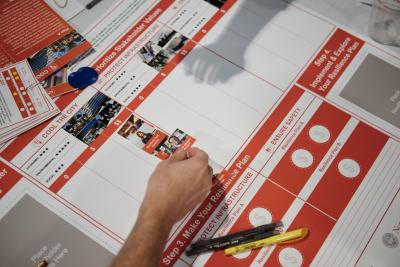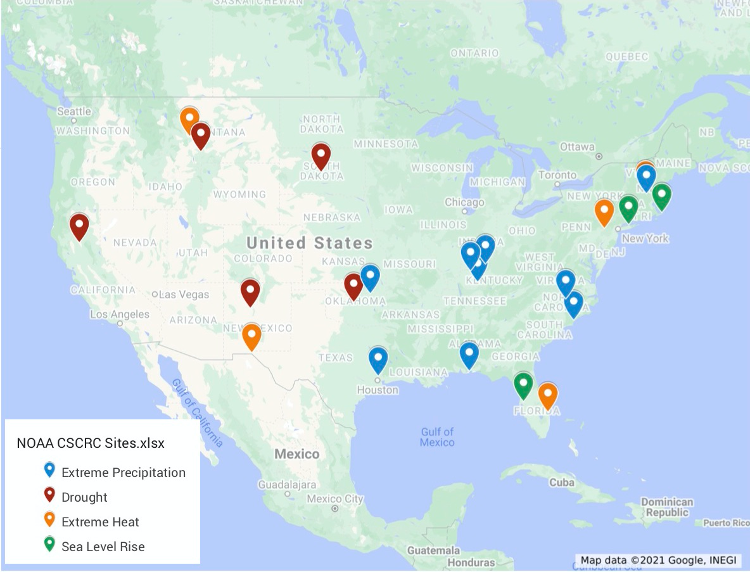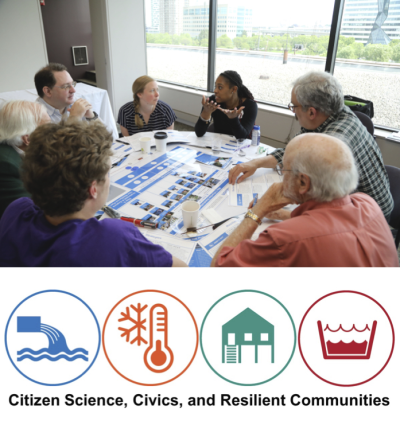Through forums and citizen science projects, museums engage the public in active learning and resilience planning around heat waves, sea level rise, extreme precipitation, and drought.
Description
The "Citizen Science, Civics, and Resilient Communities" (CSCRC) education project led by the Museum of Science, Boston in partnership with Arizona State University and Northeastern University will increase resilience to extreme weather and environmental hazards through citizen-created data, local knowledge, and community values. Building upon previous funding from NOAA in which a set of modules were created and used to engage participants in active learning and resilience planning about four natural hazards (heat waves, sea level rise, extreme precipitation, and drought), the museum and its partners will add participatory citizen science activities selected in close collaboration with resilience planners.
This new and expanded project will involve diverse groups of participants at 28 U.S. science centers collecting, analyzing, and sharing data relevant to local resilience planners, learning about vulnerabilities through visualizations of geospatial data and deliberative problem-solving, sharing perspectives about resilience strategies and their societal and environmental trade-offs, formulating community resilience plans, and presenting findings and recommendations to resilience planners and publics. The project aims to formulate a theory of action that sustains engagement and increases environmental literacy among participants, contributes citizen-created data, knowledge and values to resilience planning, and increases capacity among science centers for including publics in resilience planning and data collection.
Applications to participate are now closed. Applications were due January 15, 2021.
Please see the list of selected stipend recipients below.

Public Program Materials
Forum public program materials are available for download:
- Climate Hazard Resilience Forum: Drought
- Climate Hazard Resilience Forum: Extreme Heat
- Climate Hazard Resilience Forum: Extreme Precipitation
- Climate Hazard Resilience Forum: Sea Level Rise
Also available:
- Public Forums Manual training guide for planning and holding public forum events
Stipend Recipients
The Museum of Science, Boston and partners are pleased to announce that 22 sites across the United States have been accepted to receive a $2,000 stipend to implement the NOAA funded Citizen Science, Civics, and Resilient Communities (CSCRC) project between March and September 2021. Congratulations to our 2021 CSCRC sites! If you are close to any of these host institutions, we encourage you to participate in citizen science and attend a “Climate Hazard Resilience” Forum. We're very excited that these CSCRC project partners will facilitate these conversations in their communities, increasing resilience to extreme weather and environmental hazards through citizen-created data, local knowledge, and community values.

Drought:
- Explora Science Center and Children's Museum, Albuquerque, NM
- ExplorationWorks, Helena, MT
- Gateway Science Museum, Chico, CA
- Montana State University, Bozeman, MT
- Science Museum Oklahoma, Oklahoma City, OK
- South Dakota Discovery Center, Pierre, SD
Extreme Heat:
- Insights El Paso Science Center, El Paso, TX
- McAuliffe-Shepard Discovery Center, Concord, NH
- Nurture Nature Center, Easton, PA
- The Children’s Museum of the Treasure Coast, Jensen Beach, FL
Extreme Precipitation:
- Cape Fear Museum of History and Science, Wilmington, NC
- Discovery Lab, Tulsa, OK
- Hardin Planetarium, Bowling Green, KY
- Jesse H. Jones Park and Nature Center, Humble, TX
- Kentucky Center for African American Heritage, Louisville, KY
- North Carolina Museum of Natural Sciences, Raleigh, NC
- Owensboro Museum of Science and History, Owensboro, KY
- Pensacola MESS Hall, Pensacola, FL
- SEE Science Center, Inc, Manchester, NH
Sea Level Rise:
- Cape Cod Museum of Natural History, Brewster, MA
- Long Island Explorium, Port Jefferson, NY
- MOSI (Museum of Science and Industry), Tampa, FL
Timeline
- December 1, 2020 - Application opened
- January 15, 2021 - Final application deadline
- February 15, 2021 - Final applicants notified
- March 2021 - Sites participate in training webinars held by Museum of Science
- April – July 2021 – Sites recruit for and run citizen science projects
- May - August 2021 – Sites hold virtual individual local forum or virtual national forum
Goals and Outcomes
- Sustain engagement and increase environmental literacy among forum and citizen science participants
- Contribute citizen-created data, local knowledge and community values to local resilience planning efforts
- Increase capacity among ISE institutions for convening and leading participatory activities to engage citizens in resilience planning and data collection
- Develop a theory of action to inform future resilience planning efforts
Project Partners
- Museum of Science, Boston, MA
In collaboration with
- Arizona State University, Tempe, AZ
- SciStarter, Tempe, AZ
- Northeastern University, Boston, MA
- museum partners
About the Project
Additional resources you may find beneficial:
- Watch Wicked High Tides virtual forum hosted by Museum of Science on November 10, 2020
- Watch an online workshop recording (December 1, 2020) to learn more about the Citizen Science, Civics, and Resilient Communities project
- Museum of Science’s pilot year CSCRC project around extreme heat
- All SCPF climate resilience hazard forum modules
- SciStarter CSCRC project portal
- Public Forums Manual training guide for planning and holding public forum events
- Public Engagement with Science Guide, designed to help informal science educators develop, implement, and evaluate events that incorporate multi- directional dialogue and mutual learning.
Acknowledgements
This material was prepared using federal funds under award NA18SEC0080008 from NOAA. Any opinions, findings, and conclusions expressed in this material are those of the authors and do not necessarily reflect the views of NOAA or the US Department of Commerce.

